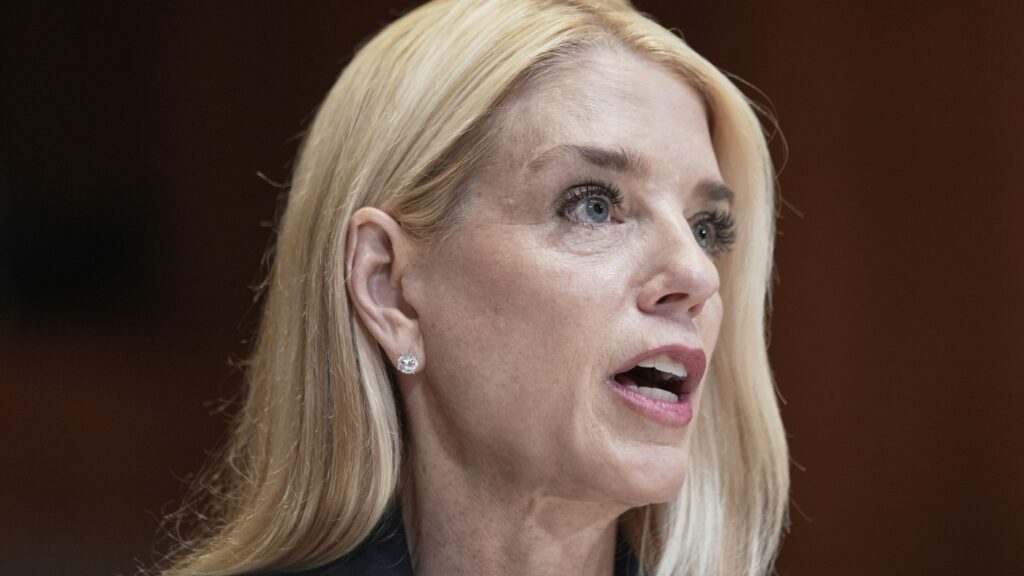
Attorney General Pam Bondi testifies during a Senate Appropriations Committee hearing on the President's Fiscal Year 2026 Budget on Capitol Hill, Wednesday, June 25, 2025, in Washington. (AP Photo/Mariam Zuhaib)
WASHINGTON, D.C. – In a bold legal maneuver, the Trump administration has filed a lawsuit against all 15 federal judges in Maryland, challenging an order that blocks the immediate deportation of migrants contesting their removals.
Breaking: Legal Battle Over Deportation Orders
The lawsuit, filed on Tuesday, underscores the administration’s determination to assert its authority over immigration enforcement. This move intensifies a long-standing conflict with federal judges who have repeatedly invalidated executive actions deemed unlawful.
“It’s extraordinary,” Laurie Levenson, a professor at Loyola Law School, remarked. “And it’s escalating DOJ’s effort to challenge federal judges.”
Immediate Impact
At the heart of the lawsuit is an order by Chief Judge George L. Russell III, issued in May, which prevents the immediate deportation of immigrants who file for a review of their detention in Maryland. This order halts deportations until 4 p.m. on the second business day after filing a habeas corpus petition.
The Trump administration argues that this automatic stay on deportations contradicts a Supreme Court ruling and hinders presidential authority on immigration matters.
Key Details Emerge
The administration’s legal action comes amid a series of judicial rulings that have blocked President Trump’s policy initiatives, particularly on immigration. The Justice Department has voiced increasing frustration, accusing judges of overstepping their bounds and obstructing the president’s agenda.
“President Trump’s executive authority has been undermined since the first hours of his presidency by an endless barrage of injunctions designed to halt his agenda,” stated Attorney General Pamela Bondi.
Industry Response
A spokesperson for the Maryland district court declined to comment on the lawsuit. Meanwhile, Trump has publicly criticized adverse judicial decisions, once calling for the impeachment of a federal judge in Washington over a deportation-related order.
This prompted a rare response from Supreme Court Chief Justice John Roberts, who emphasized that impeachment is not an appropriate response to judicial disagreements.
Background Context
Among the judges named in the lawsuit is Paula Xinis, who has previously ruled against the deportation of Kilmar Abrego Garcia to El Salvador, labeling it illegal. Attorneys for Abrego Garcia have sought fines against the administration for contempt, citing non-compliance with court orders.
Judge Russell’s order aims to preserve court jurisdiction and ensure that immigrant petitioners can participate in legal proceedings and access legal counsel.
In an amended order, Russell noted an influx of after-hours habeas petitions, leading to rushed hearings and difficulties in obtaining clear information on petitioners’ statuses.
Expert Analysis
The administration has requested that Maryland judges recuse themselves, seeking a federal judge from another state to preside over the case. James Sample, a constitutional law professor at Hofstra University, views the lawsuit as indicative of the administration’s erosion of legal norms.
“Normally, when parties lose an injunction, they appeal the order — not sue the court or judges,” Sample explained.
He acknowledged that while injunctions are typically extraordinary relief, the administration’s actions have prompted judicial intervention to ensure due process.
What Comes Next
The lawsuit represents a significant escalation in the administration’s ongoing battle with the judiciary. Legal experts predict that the case could set important precedents regarding the balance of power between the executive branch and the judiciary.
The outcome of this legal confrontation remains uncertain, but it is likely to have far-reaching implications for immigration policy and executive authority in the United States.






